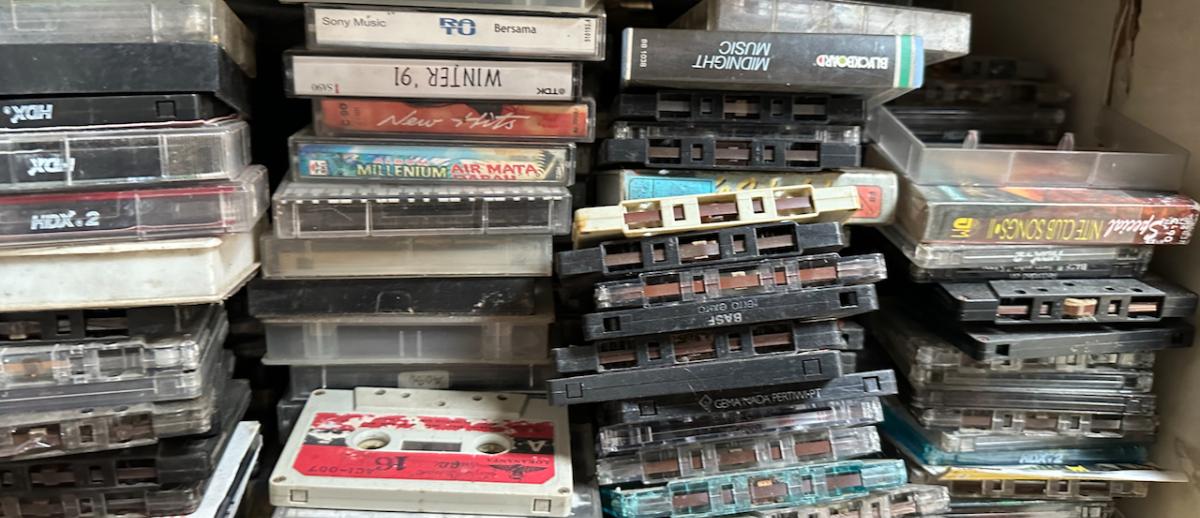Traveling with Tape: Irama Nusantara and the Digital Migrations of Indonesian Popular Music
archive


Collection of cassette tapes in a public market in Surakarta | Photo by David Novak
Traveling with Tape: Irama Nusantara and the Digital Migrations of Indonesian Popular Music
David Novak (University of California Santa Barbara)
Irama Nusantara Collective (Jakarta, Indonesia)
Recording and transcription: David Novak. Audio Editing: Frank Pattinasarany.
D: Traveling with Tape is a collaboration between David Novak and the Irama Nusantara media and sound archiving collective based in Jakarta, Indonesia. The group initiated a data-collecting effort starting in 2013, that includes gathering, documenting, and digitally archiving Indonesian popular music recordings, accessible as streaming files and images on the Irama Nusantara website. The collection includes works that date from the early 1900s - the starting point of the Indonesian popular music industry – but which focus primarily on media produced after Indonesia’s independence in 1945 with the rapid growth of local recording companies. The goal is to introduce people, both within Indonesia and around the world, to the preservation of Indonesian popular music recordings and reveal their historical role in the nation’s contemporary culture. Through a digitally accessible web platform, Irama Nusantara invites the Indonesian public to take part in the archiving initiative, in hopes that these shared resources can be preserved and circulated for academic and educational purposes. For this audio documentary, I accompanied Irama Nusantara’s Gerry Apriryan to Surakarta, where we visited an open-air market and picked up a set of cassettes to bring back to Irama Nusantara headquarters in Jakarta. We traced the collective’s digital migration of one specific cassette tape by Jamal Mirdad, released by the Musica label, and explore the unique problems and opportunities that emerge when we listen to musical history through the reels of the cassette. We document ethnographically the process of collection and transfer of this physical media object, as well as using the audio cassette as a conceptual hinge that opens up the complex histories of Indonesian popular music.

Photo of select cassette tape found in public market in Surakarta | Photo by David Novak
The following text is comprised of excerpts from the English language version of Traveling with Tape. The audio file (47:00) allows you to hear musical examples and the voices of several staff members within the collective. The full recording and transcript are accessible for streaming and download here.
Voices:
G: Gerry Apriryan (General Manager)
D: David Novak (Researcher)
C: Cestya Parahita (Social Media Administrator)
K: Windi (Koben) Prahadya (Operations Manager)
R: Renovan Rivandy (Audio Archivist)
D: How did it all start? What was the idea behind Irama Nusantara?
G: Irama Nusantara started in 2013. At that time, the founders felt that many young people had lost access to things (especially music) of the past. Indonesian songs recorded in analog formats were not being updated into digital contexts, so young people just didn’t have access to these songs. The founders felt it was important to connect the younger generation with the popular music Indonesia had created in the past. Of course, this isn’t just true for music, but almost all popular cultural products in Indonesia. Things from the old days, especially physical media like recordings, are now considered obsolete. It seems like we are supposed to just move forward without reflecting on the past. So, the founders felt like this archive of older music needed to be shared with the public at large. And that’s how we started Irama Nusantara.
In 2013, Irama Nusantara started uploading the materials to a website. The website features music separated by album, year, including the performers, metadata, and the tracks themselves, in a low quality version to avoid piracy. The collective started by digitizing music from various analog formats. In the past decade, they hove digitized around 9000 recordings, including records, and cassettes, as well as popular press materials and other media related to Indonesian popular music.
G: The first focus was just on vinyl. But as time went on, we added earlier formats on shellac, gramophone discs, and 78s. Then we started include other forms of mass media, like magazines, anything that published anything about Indonesian popular music. Finally, in 2020 we started to working on the cassette format, which is really a big deal in Indonesia, just in terms of quantity.
K: Why does Irama Nusantara exist? The situation is like this; first, literacy among Indonesians is somewhat low. This isn’t just literacy in the sense of reading, but also in terms of knowing about things, researching, and asking questions about culture. Secondly, because Indonesian culture is stronger in oral tradition, rather than documentation, so it’s more difficult for Indonesians to get used to keeping records. That means we’ve lost a lot of artefacts, even the history of the nation itself, because it is almost never presented in the form of a complete record. Adding to that - the tag-line that we use is "Lagu Baru Dari Masa Lalu” (New Songs From the Past). These songs are from the past, but because they can only be heard now – because access has just been opened – it finally becomes something new for the current generation.
R: Other than a bridge between generations, Irama Nusantara is not just a place for nostalgia, but for people to discover new things, even if they have actually been around for decades. It's a funny thing if we think about it; some old thing, worn out, but people are only discovering it now. Like, wow, where have you been all this time?! But that’s just the way it is. So, yeah, we will have to be patient, maybe for decades, to understand something of this value.
K: It’s important to know this - we’re not just trying to save the archives. We’re trying to encourage the current generation to utilize these archives: to create new works, new products, whether it's in the form of composing songs into modern versions, reissues, books, or films, so that the existing archives don't just become piles of records, but material that can turn into new work.
G: Apart from being distinctly different musically and geographically, we also have a strategic position in the world, as the crossroads of many cultural paths, which eventually "collide" so as to create a unique and new character, in terms of music and sound versus other countries. Other countries might also have a similar situation, but Indonesia is unique as a large archipelagic country – there are so many sub-cultures and traditions that mutually influence one another.
R: And, it also has something to do with colonialism, which adds quite a big impact on Indonesian society in terms of how people express themselves. Indonesia, Southeast Asia in general, has a tropical climate -- It’s right on the equator -- which means any media made from paper, cassette tape, or vinyl, is not very durable. Materials that would last decades in non-tropical countries can only lasts for 10 years or less here. It’s kind of a nightmare, and we might feel like just giving up “Ah, never mind, why keep it, just throw it away...”. But we need to find a way to overcome this mentality, and not surrender to the situation.
K: Because we are still a developing country, state funds are prioritized for basic needs. On one hand, we understand that funds are limited, but on the other hand, in a climate like this, goods break down quickly, if they are not saved immediately, they will disappear altogether. So, when internet technology emerged, especially cloud servers, it finally helped us to begin to save the existing archives. It's just impossible for us to store the records in its physical form. Firstly due to space limitations, and secondly because the maintenance and storage costs would be huge. So it's better for us to borrow the records, digitize them, and return them to their owners. It would be a kind a waste if they are stored physically with us because we can’t afford to take care of them properly, so we are just working toward a digital archive.
G: When [the founders] started Irama Nusantara, they chose to build it collectively, not just one person. It wasn’t just David Tarigan or Alvin by themselves - actually, they are both big collectors, so they might have even be able to do it on their own -- but they knew that they needed to share the work. And then they consciously continued this concern, in the sense that the awareness to carry out collective archiving had to go beyond them. So they invited us, the younger generation, to participate and also to start making connections with communities in other areas outside of Bandung and Jakarta. So that’s what we think, and why we made these decisions, knowing that the activity of archiving popular music is a shared responsibility – actually, a responsibility we share with the whole of Indonesia. It can’t just be up to a handful of people, because this belongs to all Indonesians, not just us.
This audio documentary was supported by a research grant from the Orfalea Center for Global and International Studies at UCSB, and is a publication of the Social Data and the Archive Research Cluster. Irama Nusantara is on the web at iramanusantara.org.



